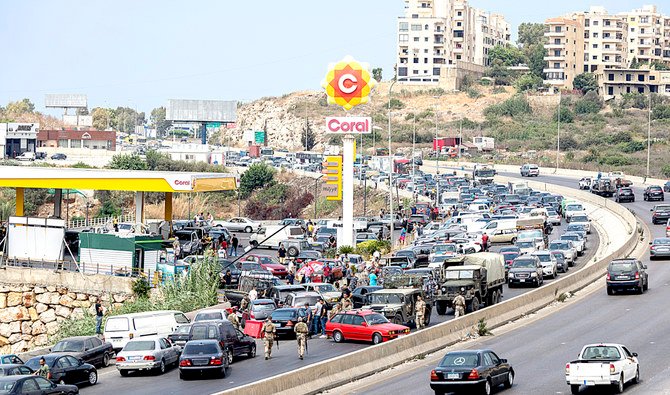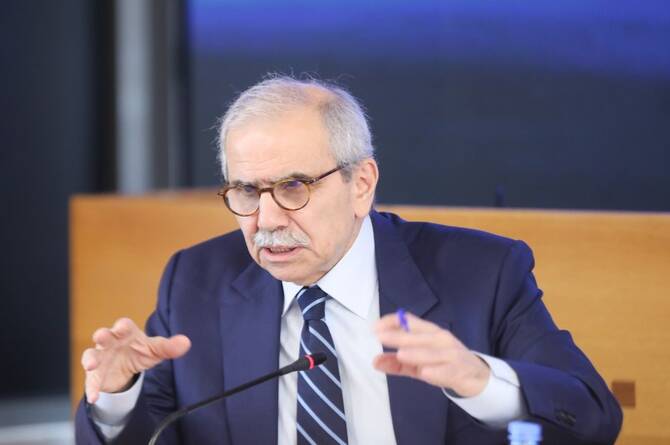Najia Houssari
BEIRUT: Lebanon is heading toward more “chaos and poverty” if a government is not formed within the next few hours, a lawmaker has warned, with the end of this week marking 13 months since the resignation of Prime Minister Hassan Diab’s administration.
Diab stepped down in the wake of the Aug. 4 port blast that devastated the capital, but he has stayed on in a caretaker capacity.
Three prime ministers have been designated to form a government. None have succeeded including, so far, the most recent appointee Najib Mikati.
The political uncertainty takes place amid a worsening social and economic crisis, and with a substantial proportion of the population unable to provide for themselves. Calls and mediation from within Lebanon and abroad show no solution for the complications involved in assembling a government.
President Michel Aoun’s term ends in October next year, while parliament’s term ends next May.
Vice president of the Future Movement, Mustafa Alloush, told Arab News: “Unless a government is formed in the next hours, Lebanon is heading toward more chaos and poverty. There will be no parliamentary elections or state, only (the) drawing of new sectarian maps that are independent of each other.”
He noted that attempts to form a government had been ongoing for more than a year and were going toward a government that was independent of political powers. He added, however: “Today we have resorted again to forming a government of the same kind of governments that destroyed all the experience of executive power.”
On whether the president would seek to remain in power after the end of his term as he did in the 1980s, Alloush said: “Aoun will not repeat his experience of fleeing from the presidential palace. He is concerned with passing on politics to Gebran Bassil, his son-in-law, and giving him a clear share in the next formulation of authority. He is now waiting for his international and regional supporters. If they give him guarantees to achieve that, a government will be formed within hours.”
Addressing his supporters on Sunday evening, head of the Lebanese Forces party Samir Geagea lobbied for presidential elections and reiterated his party’s demand for early parliamentary elections. Lebanese media recently shed light again on a legal study from Judge Peter Germanos. He is close to the Free Patriotic Movement, which was founded by Aoun and is led by Bassil.
The study said it was “necessary” for the president to stay after his term had ended if the government was a caretaker government, in the event of being unable to elect a new president.
A government that had resigned could not be given the president’s jurisdiction and a presidential vacuum went against the principle of public service, leading to a vacuum in procedural authority, he wrote.
He said the president whose term had ended must stay in order to facilitate daily work until a new president was elected, his term was renewed, or a new government, backed by parliament, was formed.
Several lawmakers warned of the dangers the Germanos study posed to the work of institutions because it legislated “any president to deliberately obstruct the formation of the government in order to stay in position, which brings Lebanon back to pre-Taif Accord days and is unacceptable nationally.”
Geagea, who fought the Elimination War with Aoun in the 1980s, described the president on Sunday as “the era of total collapse run by a ruling clique with Hezbollah and the FPM at its core, that waived the state’s authority and sovereignty, paralyzed its establishments, and turned it into a failed state that is run by corrupt failed people, thieves, traitors and criminals.”
He regretted that “electing Aoun as president, which the LF participated in, had catastrophic consequences on the Lebanese people, especially Christians.”
Geagea considered Hezbollah, Aoun’s ally, as “primarily responsible for Lebanon’s destructive economic crisis, after it (Hezbollah) severed Lebanon’s relations with its Arab surroundings and involved it in pointless regional disputes.”
He said: “As we call for early parliamentary elections, we also call for early presidential elections. We denounce the submissive president who bargains with fundamentals, and also reject the powerful president who chooses his interests and the interests of his followers at the expense of the state and all the Lebanese people.”
Geagea warned that postponing or canceling the next parliamentary elections would spark a “different form of revolution” and stressed that the elections aimed to “rewrite the balance of power in the parliament, from which presidencies, governments and policies emerge.”
FPM MP Salim Aoun expressed his “optimism” in the possibility of a government being formed in 48 hours.
He said: “The president facilitated everything, even the blocking third, and no one, internally or externally, wants the non-formation of the government.”






















